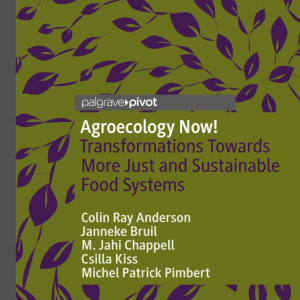
This open access book explores the conditions that support or hinder the transition of the food system towards agroecology: rights and access to nature; knowledge and culture; systems of economic exchange; networks; equity; and discourse.
Publisher’s summary
This open access book develops a framework for advancing agroecology transformations focusing on power, politics and governance. It explores the potential of agroecology as a sustainable and socially just alternative to today’s dominant food regime. Agroecology is an ecological approach to farming that addresses climate change and biodiversity loss while contributing to the Sustainable Development Goals. Agroecology transformations represent a challenge to the power of corporations in controlling food system and a rejection of the industrial food systems that are at the root of many social and ecological ills. In this book the authors analyse the conditions that enable and disable agroecology’s potential and present six ‘domains of transformation’ where it comes into conflict with the dominant food system. They argue that food sovereignty, community-self organisation and a shift to bottom-up governance are critical for the transformation to a socially just and ecologically viable food system. This book will be a valuable resource to researchers, students, policy makers and professionals across multidisciplinary areas including in the fields of food politics, international development, sustainability and resilience.
Reference
Anderson, C.R., Bruil, J., Chappell, M.J., Kiss, C. and Pimbert, M. (2021). Agroecology Now! Transformations Towards More Just and Sustainable Food Systems. Palgrave Macmillan, London.
Read more here and access the free digital version of the book here. Hardcover copies are available to purchase. See also the Table explainer What are food systems?







Post a new comment »